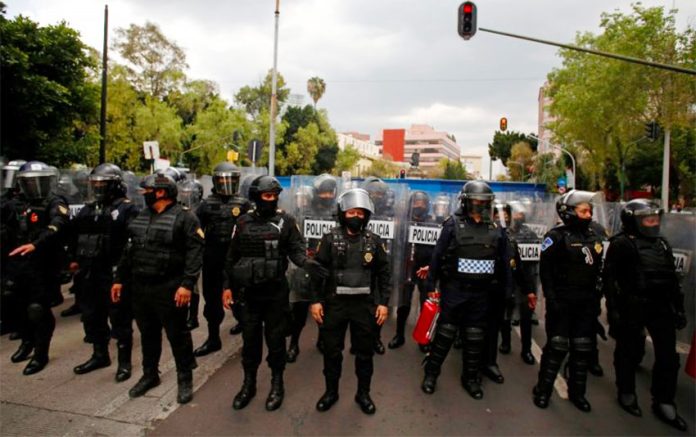On the 528th anniversary of Christopher Columbus’s arrival in the Americas, protesters took to the streets this week in several Mexican states to denounce the “genocidal” explorer.
A statue of Columbus on Mexico City’s Reforma Avenue was removed on the weekend, ostensibly for restoration, but it came after threats to topple it. Nevertheless, protesters arrived at the statue’s base Monday and graffitied the fence that has been installed around it.
Among the messages: “Nothing to celebrate, nothing to forgive, everything to tear down,” “528 years of struggle, organization and resistance – the fight continues,” “Down with the symbols of colonialism” and “Good riddance, genocida [a person guilty of genocide].”
Another group of protesters made their way to a statue of Columbus in the Buenavista neighborhood, where they encountered a cordoned-off statue and a contingent of police who stymied their goal of defacing or bringing down the explorer’s likeness.
In Chilpancingo, Guerrero, protesters including members of the CNTE teachers union blocked traffic on the Mexico City-Acapulco highway for an hour to mark the anniversary of Columbus’s arrival.

In Morelos, indigenous protesters expressed their support for President López Obrador’s request to Pope Francis for a public apology from the Catholic Church for the abuses committed during the Spanish Conquest of Mexico. In Oaxaca, there were protests to demand respect for indigenous peoples and to denounce large-scale energy projects, the newspaper El Financiero said.
Groups with links to the Zapatistas protested in the Chiapas cities of Tuxtla Gutiérrez and San Cristóbal de las Casas, where they condemned the negative impact of the Conquest and subsequent colonization.
The condemnations of the Genoan explorer are not new.
César Morado, a historian at the Autonomous University of Nuevo León, told the newspaper El Norte that condemning Columbus – whose expeditions were sponsored by Spain – and debate about his legacy go back centuries.
“It’s an old conflict we’ve had since the 19th century,” he said, adding that there has long been a debate between the aztequistas, those who hold up indigenous customs and traditions as superior, and the hispanistas, those who favor the Spanish.
“This debate is highlighted now due to the fact that society is more interconnected by social media but the bottom line is the same: it’s a matter of how we interpret history,” Morado said.
There is Columbus the explorer and conquistador and Columbus the perpetrator of atrocities against indigenous peoples, he said.
However, Morado noted that the history written by the winners, the conquistadores, became the dominant one. But opposing narratives are now becoming more prominent, the historian said.
According to another historian, the marginalization faced by indigenous people in Mexico today cannot be attributed to Europeans’ “discovery” of the Americas in the 15th century and the subsequent Spanish Conquest.
Luis Alberto García told El Norte that he believed that an apology for the Conquest, which López Obrador has also sought from the King of Spain, is unnecessary.
An apology, he said, “won’t change the current situation at all nor establish a plan to do so.”
Source: El Norte (sp), El Financiero (sp)
